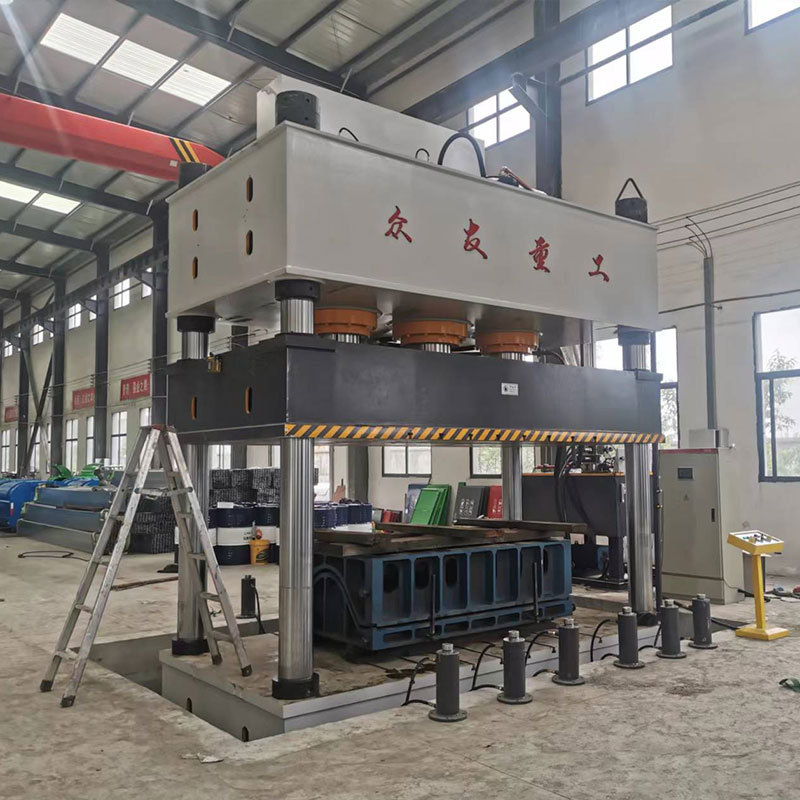Zhongyou Heavy IndustryThe hydraulic press equipment produced is widely used in aerospace, nuclear power, petrochemical, auto parts, bicycle parts, hardware products, instrumentation, medical equipment, household appliances, household utensils, sanitary kitchenware and other manufacturing industries.
Since all the heavy operations must be performed on the hydraulic press, you may encounter some problems related to the machinery. Here are some common problems and how to solve and avoid them. In this paper, the common faults, solutions and preventive maintenance skills of hydraulic press are brought by Zhongyou heavy industry.
Common problems and solutions of 1. hydraulic press:
1) Oil leakage:
One of the most reported problems is oil leakage. You will notice oil around the plunger, hose end joints and hydraulic lines.
Solution:
Make sure to use the recommended oil for the hydraulic press and that all fittings are tightened.
2) Overheating:
Excessive pressure and friction, as well as contamination or degradation of the hydraulic oil, may cause the press to overheat. The temperature of the hydraulic press must never exceed 150 °F, because overheating may damage the sealant.
Solution:
Make sure you don't over-squeeze, change the oil regularly and clean the filter.
3) Slow pressure build-up:
Generally, the hydraulic machine should reach the required pressure level in about one second, which should be longer than this time, which means that there is a problem with the pump, the fluid is not leaking into the plunger fast enough, which may be caused by leakage or dirt trapped in the liquid.
Solution:
Make sure to check the pump and surrounding mechanisms such as overflow valves and motors to make sure everything is normal and clean.
4) Abnormal noise:
If you hear the impact or knocking sound of the hydraulic press, it may be a sign of air in the fluid. You may also experience foam and abnormal movement of the actuator, loss of lubrication, overheating and damage to components are some of the problems caused by this.
Solution:
1. Check the liquid level and make sure it is correct, and check whether the pump shaft seal leaks.
2. Regular maintenance and inspection will extend the service life of the hydraulic press, but unfortunately it will not make it permanent. When you find more serious problems, such as broken racks, electrical problems and insufficient pump pressure, it is time to say goodbye, Make sure you take care of your technology and make the most of it!

Four tips for 2. preventive hydraulic maintenance:
If you operate hydraulic equipment, it is important to maintain it properly. This does not mean paying attention only when errors are found. Preventive maintenance is very important to keep hydraulic equipment operating effectively throughout the year, and can also help you avoid expensive and lengthy repairs.
Unsure how to participate in preventive hydraulic maintenance? Continue reading for four tips on how to properly maintain hydraulic equipment!
1) Check the liquid level and replace if necessary
One of the important parts of a hydraulic system is fluid, because fluid transfers pressure from one part of the system to another. However, it is important to ensure that the fluid level remains fine and that there are no particles in the fluid. Make sure to check the fluid and replace it if necessary.
2) Check the filter and replace it if necessary
The filter is important to keep the liquid clean and viscous. However, over time, the hydraulic filter may become clogged. This is bad because it increases the pressure on the system and does not always allow the hydraulic oil to move freely. Make sure to check the hydraulic filter and replace it regularly according to the manufacturer's instructions.
3) Ensure that the hose and valve are rated correctly
Hydraulic hoses are essential for any hydraulic system. When choosing hydraulic hoses for your system, you need to make sure that they have been properly evaluated for the temperature and pressure on which you want to run the system. You should also ensure that hydraulic hoses and valves are checked regularly for cracks or signs of deterioration. These hydraulic components are sensitive and can cause serious damage to the hydraulic system if a problem occurs.
4) thoroughly check whether there is a problem with the equipment
After but equally important, you should also conduct a thorough inspection of your hydraulic equipment on a regular basis. Find any components or areas of work that require attention. If you can't solve the problem yourself, you need to find a professional.










